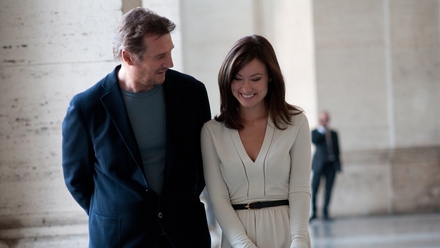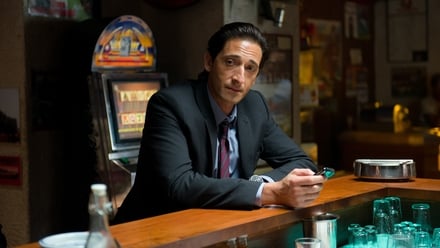With the Liam Neeson-starring Third Person now in cinemas, Harry Guerin talks to director Paul Haggis about his new ensemble drama, the rest of his cast and why he has Ireland on his mind.
He's at it again. Having so successfully explored the messiness of adult life, chance and fate in his Oscar-winning Crash, writer-director Paul Haggis has put together another all-star cast to ask the big questions in Third Person.
Whereas the Best Picture, Best Screenplay-winning Crash was set in one city, Los Angeles, Third Person tri-locates for its stories of love and loss, endings and beginnings and how small things can end up having such huge consequences.
Liam Neeson plays a Pulitzer Prize-winning author who meets his lover (played by Olivia Wilde) in Paris. Adrien Brody is a businessman killing time in a Rome bar who has his head turned by a stranger (Moran Atias) a couple of stools down. Mila Kunis portrays a former actress whose life is falling apart in New York. The cast also includes James Franco, Maria Bello and Kim Basinger. The performances are all excellent.
Here, Haggis talks about bringing the interlocking stories to the screen, his cast and his futures plans.
Harry Guerin: When you're making an ensemble piece like Third Person, and you're trying to get all the actors to sign up, is there a bit of a 'Magnificent Seven' element - where one will only join when they see who else is involved?
Paul Haggis: [Laughs] I guess so! I was fortunate enough to get Liam Neeson right off the bat and Olivia Wilde - I had those two from the start - and then they all came on [board]. I was really happy that casting this project was not that much of a problem. I had to wait for Liam for a while because the project got pushed [back] and his Taken movies were so [successful]. It took me a while because I knew I wanted Liam to do it. Once we got the money and we were able to make the offers it just all came together very quickly.
You didn't write any of the characters with specific actors in mind, so how soon after you had finished the character of the author Michael did Liam Neeson come into your head?
Oh, seconds! [Laughs] It's when you actually sit down... We wanted a man's man in this role, and you also want a man who you can empathise with. And it's really hard to empathise with Liam Neeson's character [in this film] because of Liam! He's just so soulful and so caring and such a beautiful man - and at the same time he can play a tough son of a *****! In this piece [film], when you have somebody who's doing surprising things, and things that you may not like at some point, you want to be able to follow him. You want to be able to empathise with him.

So which was the toughest role to cast?
I think the Adrien Brody one. Adrien wanted to do it but I thought he was completely wrong for it because he's such a ladies' man! He's so suave, he's so worldly and I had to find somebody who hated being in Italy, who hated everything about Italy - this ugly American character who's just a little bit dense - but a very smart guy in many other ways - who could fall for this impossible woman and then just decide to believe her and follow her. That was the hardest one. But of course I realised quickly that Adrien is a wonderful actor who could play it.
And the hardest story to get right?
Well, they all interweave so it was difficult... I think Liam's story. What's actually happening in this movie: this is something where it pretends to be three love stories but it's actually something else. I knew it was going to be a bit of a balance because a third of the way into this film things start happening that just cannot happen. So I wanted to say, 'Ok, stop. If that can't happen then what's happening, and more importantly, why?' It's a puzzle. It's not a Rubik's Cube; it's not that hard to figure out what's going on. But why is it happening? There's lots of levels in this film and finding that balance - how much to give away, how much to withhold... I wanted it to be one of those double-date movies. You go together and you have an emotional reaction at the end and you walk out on the sidewalk and you talk to your friends and you put it all together and you feel good!
My feeling was that depending on whether you're an optimist or a pessimist, you either see it as a hopeful movie or a grim one.
Yeah, well, it's like life isn't it? Not everybody wins [laughs] but hopefully the ones that risk the most win the most in this film. Some of them risk a lot and lose.
So how much good and bad of yourself do you see in elements of the male characters - or, indeed, the female ones?
I'm in all the characters because I was trying to explore different ways that you love people and can love people. If you trust someone, if you decide to trust them no matter what, if you believe in them, even if all the evidence is against it and you shouldn't - what happens then? Do people rise to that? Do they become their better selves because we believe in them? Or if you show them the worst of themselves what happens there? Do you win or lose? And also, if someone changes for you - really works on themselves and changes - do they change into someone you no longer love? Lots of different questions are in here. I was also fascinated by the artistic process itself and the creative process and [that] who pays the price for our creativity is usually not us.

I felt there was a theme of surrender too.
Yeah, absolutely. You're afraid of opening up and how many of us are [afraid]? You're truly afraid of surrendering to love, to being that open because people can betray you. [Laughs] But it's the only way to truly win, and it's the only way to truly lose! You win big, lose big in this one.
But it's not too late for fresh starts.
That's true, absolutely the case. Just when you think that you're irredeemable someone will come along. And it's what you do that will save yourself: you think you're saving somebody else and you're just saving yourself. It's ourselves we truly have to take the risk on.
You've said you had a great experience filming Third Person in Rome with Italian crews. Irish crews also have a great reputation, so would you ever thinking of making a film here?
I'm hoping to come to Ireland to do my next film. I've got a project and I'm trying to put it together right now.
Really?! What's it about?
I can't tell you - it's all a secret!
Well, you've always had a lot of Irish references in your work; most famously, your Oscar-nominated screenplay for Clint Eastwood's Million Dollar Baby, which saw boxing coach Frankie Dunn (Eastwood) learning Irish, reading WB Yeats and calling boxer Maggie Fitzgerald (Hilary Swank) 'Mo Chuisle'. Why the fascination?
[I am] Irish on my dad's mother's side. [I] just seem to have a great affinity for the Irish. Always have. Irish and Italian are my two favourite people.
So you making a film in Ireland is like that old adage about destiny: 'When the pupil is ready the master appears'.
In this case when I'm ready Ireland appears!
And given that you've had such success as a screenwriter and Third Person is about an author, could you ever see yourself writing a book?
Oh yeah, that's never going to happen - those are real writers!

